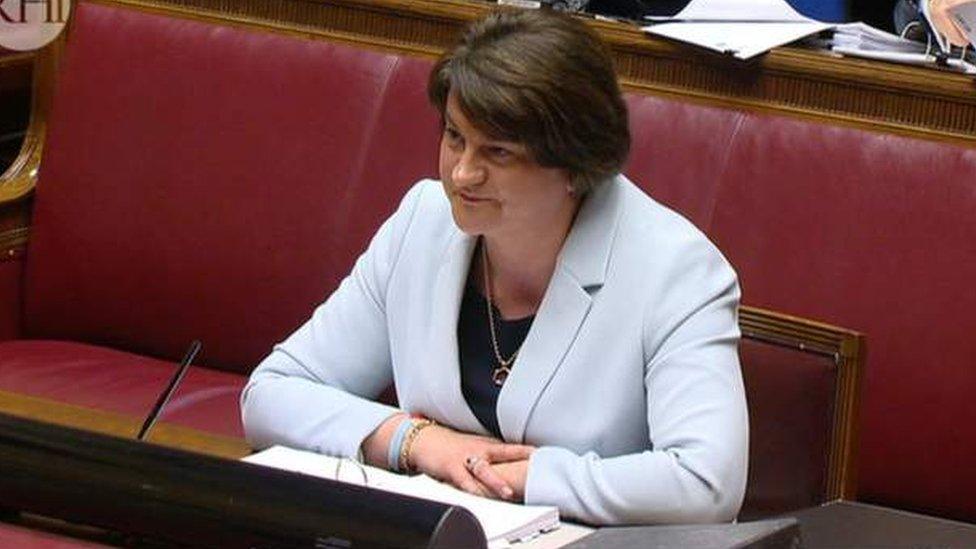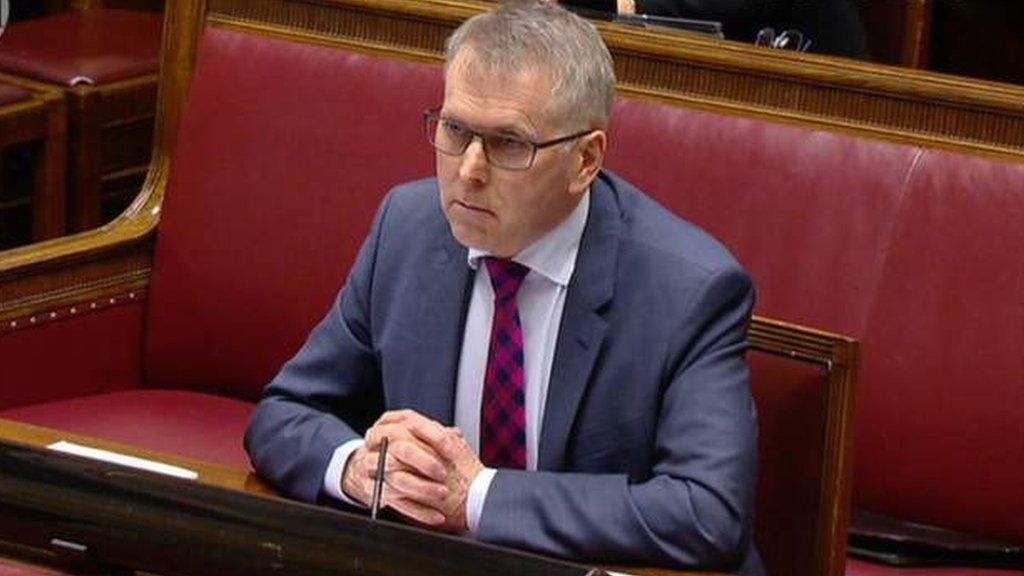Is RHI Inquiry giving an insight into everyday Stormont?
- Published

Arlene Foster signed off on the flawed green energy scheme in 2012
The RHI inquiry has lasted almost 60 days so far, and some of the testimony given during it has raised questions that go to the core of devolved government in Northern Ireland.
On Wednesday, the DUP leader Arlene Foster made her third appearance at the inquiry.
Mrs Foster was the minister in charge when the flawed green energy scheme was signed off in 2012.
She has always denied any wrongdoing in relation to how RHI was handled.
Evidence revealed over the course of the RHI inquiry so far has shown the value of a public inquiry, not just through compelling high-profile witnesses such as Arlene Foster to give testimony, but also by getting behind the scenes to examine relationships between ministers and officials and the day-to-day running of departments.
On Wednesday, it was the issue of meetings between Stormont ministers and officials that gained most attention, when Mrs Foster dismissed as "nonsense" claims the head of Stormont's civil service made in March that meetings were not minuted in order to frustrate Freedom of Information requests.
Although David Sterling was speaking about meetings held between officials and ministers in relation to how RHI was handled, questions have since been asked about whether the practice of minute-taking had also lapsed across other Stormont departments.
Sinn Féin's former education minister John O'Dowd denied that on Wednesday, when he tweeted, external he had not run his department in a "dysfunctional" way.

Mr Sterling gave evidence at the inquiry in March 2018
Mrs Foster also addressed a claim by David Sterling that the DUP and Sinn Féin had become "sensitive to criticism" over unpopular decisions, during the 10 years of devolution before the assembly's collapse last year.
Asked if she accepted that, Mrs Foster said: "I did smile when I read that - I don't think any politicians aren't sensitive to criticism."
She said all politicians were sensitive to criticism but that didn't prevent them taking unpopular decisions - and that anyone in politics who was sensitive should ask themselves if they're "in the right job".
The DUP leader also made reference to the challenges and criticism she has faced over her handling of RHI and leadership of her party during the past year, smiling as she said she believed she was "tougher than most" politicians.
'Around the edges'
During the course of the inquiry, there have been repeated references to the RHI scheme in Great Britain, and why Stormont's Department of Enterprise, Trade and Investment (Deti) chose to set up a specific Northern Ireland RHI scheme rather than copying the GB version.
The inquiry has heard suggestions that the RHI debacle might never have happened if Northern Ireland officials had simply copied an existing GB scheme.
On Wednesday, Mrs Foster was asked about the relationship between her RHI team and the team in Great Britain, and gave her thoughts on how she felt relationships generally are forged between Stormont and other governments.
The DUP leader said she now has "probably more contact in her political life today with government ministers in Westminster" - presumably due to the confidence and supply deal between her party and the Conservatives after last year's general election - than she did when she was Northern Ireland's first minister.
'Realpolitik'
That is a claim which may not come as a surprise to many, given Prime Minister Theresa May's reliance on the DUP now due to her slim majority in the Commons.
But it was what she said about meetings of the North-South Ministerial Council - the cross-border co-operation body set up during the Good Friday Agreement - that was perhaps more unusual.
"Here I am, a unionist, making this point," Mrs Foster told the inquiry, "during meetings of (the council) there is more done around the edges of the meeting than in the meeting itself", when it comes to building relations between Stormont and Irish ministers.
She described that as "realpolitik", adding that in hindsight, she felt had there been more "coming together at different levels" during the establishment of the Northern Ireland RHI scheme, it would have been helpful to her department in the long term.
As the inquiry continues, how many more times will hindsight be mentioned when it comes to looking at what went wrong with RHI, and just how much concern will that cause among the public about the system of devolved government in Northern Ireland?
- Published18 April 2018

- Published18 April 2018

- Published7 November 2017

- Published7 November 2017

- Published18 April 2018
